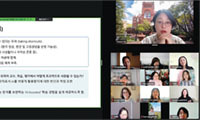▶ MAUREEN DOWD
It’s hard to say what is weirder:
A Sister of Mercy writing about the Kama Sutra, sexual desire and “our yearnings for pleasure.”
Or the Vatican getting so hot and bothered about the academic treatise on sexuality that the pope censures it, causing it to shoot from obscurity to the top tier of Amazon.com’s best-seller list six years after it was published.
Just the latest chapter in the Vatican’s thuggish crusade to push American nuns — and all Catholic women — back into moldy subservience.
Even for a church that moves glacially, this was classic. “Just Love: a Framework for Christian Sexual Ethics,” by Sister Margaret Farley — a 77-year-old professor emeritus at Yale’s Divinity School, a past president of the Catholic Theological Society of America and an award-winning scholar — came out in 2006.
The Vatican’s Congregation for the Doctrine of Faith, which seems as hostile to women as the Saudi Committee for the Promotion of Virtue and the Prevention of Vice, spent years pondering it, then censured it on March 30 but didn’t publicly release the statement until Monday.
The denunciation of Sister Farley’s book is based on the fact that she deals with the modern world as it is. She refuses to fall in line with a Vatican rigidly clinging to an inbred, illusory world where men rule with no backtalk from women, gays are deviants, the divorced can’t remarry, men and women can’t use contraception, masturbation is a grave disorder and celibacy is enshrined, even as a global pedophilia scandal rages.
In old-fashioned prose steeped in historical and global perspective, Sister Farley’s main argument is that justice needs to govern relationships. In the interest of justice to oneself, she contends that “self-pleasuring” needs “to be moved out of the realm of taboo morality.”
Immanuel Kant, who considered masturbation “below the level of animals,” must give way to Alfred Kinsey. “It is surely the case that many women, following the ‘our bodies our selves’ movement in the fourth quarter of the twentieth century, have found great good in self-pleasuring — perhaps especially in the discovery of their own possibilities for pleasure — something many had not experienced or even known about in their ordinary sexual relations with husbands or lovers,” she writes. “In this way, it could be said that masturbation actually serves relationships rather than hindering them.”
A breath of fresh air in the stultifying church, she makes the case for same-sex relationships and remarriage after divorce. “When it truly becomes impossible to sustain a marriage relationship, the obligation to do so is released,” she writes, adding, “as when in the Middle Ages a broken leg made it impossible to continue on a pilgrimage to which one had committed oneself.”
Taking on the Council of Trent and a church that has taken a stand against pleasure, Sister Farley asserts that procreation is not the only reason couples should have sex. Fruitfulness need not “refer only to the conceiving of children,” she writes. “It can refer to multiple forms of fruitfulness in love of others, care for others, making the world a better place for others” rather than just succumbing to “an égoisme à deux.”
The Vatican showed no mercy to the Sister of Mercy, proclaiming that “the deliberate use of the sexual faculty” outside of marriage or procreation, or on one’s own, is wrong; that homosexual sex acts are “deviant,” and that marriages are by and large indissoluble. Sister Farley issued a statement that she did not intend for the book to be an expression or criticism of current official Catholic teaching, and academics and the head of her order rushed to her defense.
This latest ignoble fight with a noble nun adds to the picture of a Catholic Church in a permanent defensive crouch, steeped in Borgia-like corruption and sexual scandals, lashing out at anyone who notes the obvious: They have lost track of right and wrong.
Cardinal Timothy Dolan of the Archdiocese of New York blasted The New York Times after Laurie Goodstein wrote that, as the archbishop of Milwaukee in 2003, he authorized payments of up to $20,000 to sexually abusive priests “as an incentive for them to agree to dismissal from the priesthood.”
Cardinal Dolan insisted through a spokesman that it was “charity,” not “payoffs.” But if you were the parent of a boy abused by a priest who went away with 20,000 bucks, maybe “charity” is not the word that would come to mind.
Its crisis has made the church cruel. The hierarchy should read Sister Farley’s opprobrium against adults harming vulnerable children and adolescents by sexually exploiting them; respect for the individual and requirement of free consent, she says, mean that rape, violence and pedophilia against unwilling victims are never justified.
“Seduction and manipulation of persons who have limited capacity for choice because of immaturity, special dependency, or loss of ordinary power, are ruled out,” she writes.
If only the church could muster that kind of clarity, rather than Dolan-style “charity.”
스마터리빙
more [ 건강]
[ 건강]이제 혈관 건강도 챙기자!
[현대해운]우리 눈에 보이지 않기 때문에 혈관 건강을 챙기는 것은 결코 쉽지 않은데요. 여러분은 혈관 건강을 유지하기 위해 어떤 노력을 하시나요?
 [ 건강]
[ 건강]내 몸이 건강해지는 과일궁합
 [ 라이프]
[ 라이프]벌레야 물럿거라! 천연 해충제 만들기
 [ 건강]
[ 건강]혈압 낮추는데 좋은 식품
[현대해운]혈관 건강은 주로 노화가 진행되면서 지켜야 할 문제라고 인식되어 왔습니다. 최근 생활 패턴과 식생활의 변화로 혈관의 노화 진행이 빨라지고
사람·사람들
more많이 본 기사
- 남가주 전역에 ‘물폭탄’… 성탄 연휴 ‘대혼란’
- [2025년 한 해 ‘진 별’들] 미주 한인사회 원로들 ‘역사의 뒤안길’로
- 체포 불체자 수만명 물류창고에 수감 추진
- 크리스마스 연휴 음주운전 ‘꼼짝마’
- 우크라이나도 “Merry Christmas!”… 지구촌 성탄 축하
- 트럼프 ‘전쟁할 결심’?… 미군 특수부대 카리브해 이동
- 여성 살해·자녀 납치 한인 ‘수배’
- 한인타운 한복판 주유소서 강도 ‘칼부림’
- “소변 불편한데 주저하다 방광 망가져”
- H-1B ‘10만 달러 수수료’ 연방법원, 이의소송 기각
- “대학 학자금 상환 안하면 임금 압류한다”
- 새해 더 건강해지기 위한 의사의 과학적 조언 10가지
- ‘라스베가스에서 만난 한인들’
- 선우용여 “아들, 돈 없어 개밥 먹기도..아파트 마련해줬다”
- 난방기 뜯자 ‘비밀공간’ 은신 마피아 보스 체포
- 한인들 위한 무료 법률 상담회 개최
- CBS가 보류한 ‘불법체류자 추방’ 보도, 캐나다서 원본 유출
- 뚜레쥬르, 뉴욕시 맨해튼 매장 오픈
- 테슬라, “비상사태 시 차문 안 열려”
- 원·달러 환율, 당국 개입에 42원 폭락
- 여성 살해·자녀 납치 한인 ‘수배’
- [성탄절 앞둔 우울한 경제상황] ‘내 코가 석자’… 기부 급감
- 샌프란시스코, 한국 방문해 이정후와 함께 야구 클리닉
- 쿡, 나이키 주식 매입 2005년부터 사외이사
- 미·중 무역전쟁 휴전 지속… 반도체 관세도 보류
- 피클볼이 바꾸는 부동산의 얼굴
- [만화경] 해수부 부산시대
- 북가주 한인 독립운동가 ‘이대위의 날’ 제정 추진
- 바야흐로 ‘귀금속 시대’… 금·은·구리까지 사상 최고
- [전문의 칼럼] 과호흡증후군
- [스티브 강 ‘인사이드 미국’] 2026 중간선거: 트럼프 지지율 하락이 말해주는 것
- [윌셔에서] 우리 안의 ‘생각하는 사람’을 깨울 시간
- LA 마약조직 집중 단속 갱단원 등 수백명 체포
- [유혜미 칼럼] 치솟는 환율, 경제 지표의 역설
- 최강팀 OKC 천적으로 떠오른 샌안토니오… 4패 중 2패 안겨
- 북한인, 아마존 위장취업 대거 적발
- 2026년 ‘올해의 컬러’ 전격 공개… 팬톤의 파격적 선택도 포함
- 서태지, 딸·엘리와 1년 만에 근황 “좋은 소식 없어 안타까워”
- [성탄절 앞둔 우울한 경제상황] 연말 선물로 중고품 급증
- 최준희, 엄마 故최진실 생일 맞아 추억 “우리 마미 축하”
- 한국외대·연세대·한양대 GCEO 연합골프대회 성황
- 중산층이 집을 사지 않는다?… 챗GPT가 내다본 주택시장 미래
- 팔레스타인서 구금된 한인 여성 무사 귀환
- 오헌, 샌디에고 떠나 피츠버그와 입단 합의… 송성문에겐 기회
- [팜스 카지노 리조트] “새해 맞이는 팜스에서… 푸짐한 행사들과 특별요리”
- [기고] 안정의 기준은 어떻게 제도가 되었나
- 미 조선업 부활 위한 한·미 ‘마스가’ 프로젝트 본격
- 다운타운 LA 라이브에 등장한 아이스링크
- [왈가 왈부] 내란재판부·정통망법 또 수정… 졸속·땜질 아닌가요
- 글로벌미션 체임버오케스트라 자선 공연
1/5지식톡

-
 미 육군 사관학교 West Poin…
0
미 육군 사관학교 West Poin…
0https://youtu.be/SxD8cEhNV6Q연락처:wpkapca@gmail.comJohn Choi: 714-716-6414West Point 합격증을 받으셨나요?미 육군사관학교 West Point 학부모 모…
-
 ☝️해외에서도 가능한 한국어 선생님…
0
☝️해외에서도 가능한 한국어 선생님…
0이 영상 하나면 충분합니다!♥️상담신청문의♥️☝️ 문의 폭주로 '선착순 상담'만 진행합니다.☎️ : 02-6213-9094✨카카오톡ID : @GOODEDU77 (@골뱅이 꼭 붙여주셔야합니다…
-
 테슬라 자동차 시트커버 장착
0
테슬라 자동차 시트커버 장착
0테슬라 시트커버, 사놓고 아직 못 씌우셨죠?장착이 생각보다 쉽지 않습니다.20년 경력 전문가에게 맡기세요 — 깔끔하고 딱 맞게 장착해드립니다!장착비용:앞좌석: $40뒷좌석: $60앞·뒷좌석 …
-
 식당용 부탄가스
0
식당용 부탄가스
0식당용 부탄가스 홀세일 합니다 로스앤젤레스 다운타운 픽업 가능 안녕 하세요?강아지 & 고양이 모든 애완동물 / 반려동물 식품 & 모든 애완동물/반려동물 관련 제품들 전문적으로 홀세일/취급하는 회사 입니다 100% …
-
 ACSL 국제 컴퓨터 과학 대회, …
0
ACSL 국제 컴퓨터 과학 대회, …
0웹사이트 : www.eduspot.co.kr 카카오톡 상담하기 : https://pf.kakao.com/_BEQWxb블로그 : https://blog.naver.com/eduspotmain안녕하세요, 에듀스팟입니다…
케이타운 1번가
오피니언
 스티브 강 전 한인민주당협회 회장
스티브 강 전 한인민주당협회 회장 [스티브 강 ‘인사이드 미국’] 2026 중간선거: 트럼프 지지율 하락이 말해주는 것
 김홍일 케이유니콘인베스트먼트 대표
김홍일 케이유니콘인베스트먼트 대표 [기고] 안정의 기준은 어떻게 제도가 되었나
 유혜미 한양대 경제금융대학 교수
유혜미 한양대 경제금융대학 교수 [유혜미 칼럼] 치솟는 환율, 경제 지표의 역설
 성민희 소설·수필가
성민희 소설·수필가 [윌셔에서] 우리 안의 ‘생각하는 사람’을 깨울 시간
 김정곤 / 서울경제 논설위원
김정곤 / 서울경제 논설위원 [만화경] 해수부 부산시대

[왈가 왈부] 내란재판부·정통망법 또 수정… 졸속·땜질 아닌가요
 정숙희 논설위원
정숙희 논설위원온라인쇼핑과 반품, 그리고 그 이후
 파리드 자카리아 / 워싱턴포스트 칼럼니스트 / CNN ‘GPS’ 호스트
파리드 자카리아 / 워싱턴포스트 칼럼니스트 / CNN ‘GPS’ 호스트 트럼프의 새 독트린 “미국을 다시 왜소하게”
 김동찬 시민참여센터 대표
김동찬 시민참여센터 대표 [미국은 지금] MAGA의 분열, 예견된 균열의 시작
1/3지사별 뉴스

“온 세상에 평화를⋯”
숨가쁘게 달려온 2025년을 이제 1주일 남짓 남긴 채 크리스마스 이브를 맞는다. 다사다난했던 한 해를 되돌아보며 마무리하는 연말 시즌과 크리…
H-1B비자 고임금·경력자에 우선권

‘올해는 ICE 이민자 체포 광풍의 해’
올 한해동안 버지니아와 메릴랜드, DC 등에서 연방 이민당국에 체포된 사람이 1만명이 훌쩍 넘는 것으로 조사됐다. 또 미 전국적으로는 22만명…
“ATM기 사용하기 겁나네”

한인들 위한 무료 법률 상담회 개최
샌프란시스코 베이지역 한인회(회장 김한일)는 지난 20일 한인회관에서 북가주 지역 한인들을 위한 무료 법률 상담회를 개최했다. 이날 행사에는 …
여성 살해·자녀 납치 한인 ‘수배’

오늘 하루 이 창 열지 않음 닫기 





















































.png)


댓글 안에 당신의 성숙함도 담아 주세요.
'오늘의 한마디'는 기사에 대하여 자신의 생각을 말하고 남의 생각을 들으며 서로 다양한 의견을 나누는 공간입니다. 그러나 간혹 불건전한 내용을 올리시는 분들이 계셔서 건전한 인터넷문화 정착을 위해 아래와 같은 운영원칙을 적용합니다.
자체 모니터링을 통해 아래에 해당하는 내용이 포함된 댓글이 발견되면 예고없이 삭제 조치를 하겠습니다.
불건전한 댓글을 올리거나, 이름에 비속어 및 상대방의 불쾌감을 주는 단어를 사용, 유명인 또는 특정 일반인을 사칭하는 경우 이용에 대한 차단 제재를 받을 수 있습니다. 차단될 경우, 일주일간 댓글을 달수 없게 됩니다.
명예훼손, 개인정보 유출, 욕설 등 법률에 위반되는 댓글은 관계 법령에 의거 민형사상 처벌을 받을 수 있으니 이용에 주의를 부탁드립니다.
Close
x